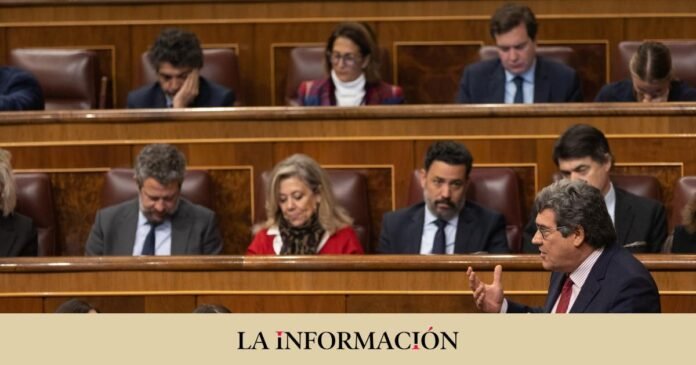The objective of carrying out the second part of the pension reform before the end of January remains immovable. The Ministry of Inclusion, Social Security and Migration is rushing deadlines with several fundamental objectives: to approve a text with which all its possible supporters in Congress feel “aligned”, just as they reside in the environment of José Luis Escrivá; avoid more reasons for friction with employers, who are not expected to assume new increases in labor costs; and try to get the unions to accept (even if reluctantly) an extension of the calculation period that the Minister intends to carry out despite the fact that he does not even have the support of the Toledo Pact commission. It is not being an easy task.
In fact, negotiating sources show this newspaper their skepticism about the state of the talks at this time of the month and see the agreement as too far away. The one that starts becomes another key week after many other conversations at a technical level but without calling the negotiating table, a system that does not fully convince the unions or the employers, but with which the Government has dealt to also speed up the political negotiation to avoid ‘scares’ such as the minimum approval of the labor reform (error through the PP).
This three-party negotiation, which has led to a delay in the terms initially agreed with the European Commission, occurs amid appeals from organizations within (Bank of Spain, AIReF…) and outside our borders ( IMF, OECD…), economists and rating agencies for Spain to step on the accelerator in pension reform. The last to do so was S&P Global Ratings, which last week raised the hole in the Social Security accounts to 1.8% this year from the 0.5% estimated by the Government -by incorporating its calculation of 15,500 million of euros in transfers from the state to the body for the so-called “improper expenses” – and that recommended raising the computation period to calculate retirement.
Regarding the latter, sources from the department headed by Escrivá issued a notice to sailors: the idea of raising the number of years of contributions used to calculate the pension from 25 to 30 is for the measure to “be neutral”, so that the system better suited to current listing races (where the last few years are not the best, however). Thus, it stresses that it is not a measure intended to increase the income of the system like the one proposed by the US rating agency. They also regret that there are those who are already judging the reform without having the complete photograph. When it is, it will be verified how “the arrival point is positive”, they settle.
Spain already went through what France during the financial crisis
In relation to the massive protests against the pension reform announced by Emmanuel Macron in France, the same sources consider that Spain has already had to make significant sacrifices in this area since 2011, which means that the country is now in a different position. In July of that year, the Government of José Luis Rodríguez Zapatero was forced by Brussels to progressively delay the retirement age to 67 years, raised from 15 to 25 those that were taken into account to calculate the pension and fixed at 33 the minimum years of contribution to be able to retire early once you turn 63.
The subsequent reform, approved in 2013 by the Executive of Mariano Rajoy, decoupled its revaluation from the CPI and linked it to the Revaluation Index, taking into account that it has been governed since 2019 by a sustainability factor that was not applied and that has been replaced by an Intergenerational Equity Mechanism, which went ahead with the first part of the current pension reform and which began to be applied in January. From the Ministry they stress that the coming reform will not mean a reduction in rights nor is it comparable to the one that the neighboring country is going to implement. The Halo government intends to increase the number of years required to receive contributions to receive the total pension, suppress several individual regimes with privileges for certain groups, as well as raise the minimum annual pension to 1,200 euros.
The measures that come
The text that Escrivá intends to have ready before the end of the month incorporates the gradual capping of the maximum contribution bases – contributions of the highest wages to the system – between 2025 and 2050. This measure will be accompanied by a review of the amount of pensions maximum, although at a lower rate. Thus, the Government would postpone to 2065 the accumulated real increase of 30% for the highest pensions. Another measure would be to improve the coverage of contribution gaps and those that seek to address the gender gap in pensions, and which would be added to the supplement that came into force last February. It is studying to improve the coverage of periods of leave for family care and reduced working hours for child care and would also be contemplating an extra increase to the annual revaluation of 10% of the gender gap supplement between next year and 2025.

